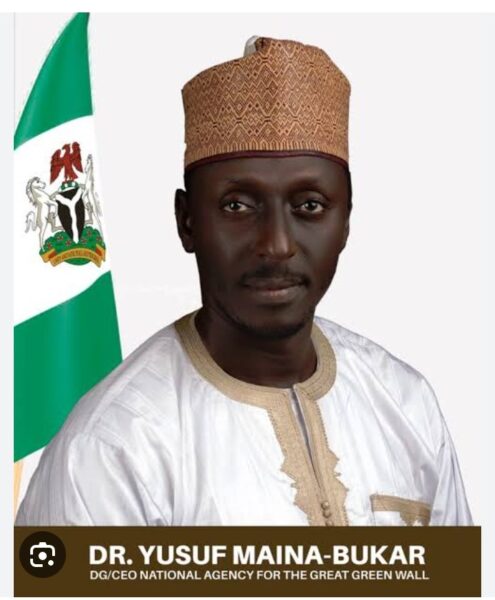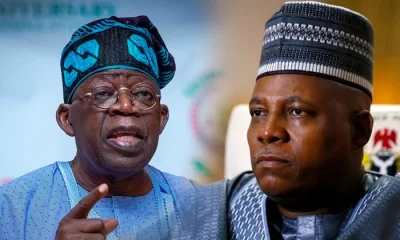Global Issues
World Environment Day 2024: Dissecting Maina Bukar’s Stride At NAGGW -By Edwin Uhara
The mission of NAGGW is to stop and reverse land degradation and prevent depletion of biological diversity, boost food security and ensure that ecosystems are resilient to climate change as well as provide essential services that will contribute to human welfare and poverty reduction in 11 front line states of Adamawa, Bauchi, Borno, Gombe, Jigawa, Kano, Kastina, Kebbi, Sokoto, Yobe and Zamfara States.

The 5th of June every year is a day set aside by the United Nations to raise awareness on environmental challenges confronting humanity as well as promote the need to take actions towards the protection and restoration of our ecosystems.
According to the United Nations Convention to Combat Desertification, up to 40 percent of the world’s land is been degraded and is directly affecting half of the world’s population.
The report went further to warn that without action, exposure to air pollution beyond the safe guidelines will increase by 50 percent within the next decade while plastic waste flowing in to the acquatic ecosystems will nearly tripple by 2040.
The report also stated that every five seconds, the equivalent of one football pitch of soil is been eroded yet it takes 1000 years to generate three centimeters of topsoil.
However, Nigeria is not left out of the global effects of climate change but I will not be focusing on the challenges but the efforts made so far to curtail the effects of global warming on our soil.
It is on this note that I will be dissecting the unrelenting efforts of the National Agency for the Great Green Wall (NAGGW) under the leadership of Dr. Yusuf Maina Bukar OON to combat land degradation, drought and desertification as well as other challenges posed by climate change to Nigeria.
The National Agency for the Great Green Wall (NAGGW) is an agency under the Ministry of Environment established in 2015 by the act of parliament to implement the vision of the African Union and it’s Heads of State and Governments.
The mission of NAGGW is to stop and reverse land degradation and prevent depletion of biological diversity, boost food security and ensure that ecosystems are resilient to climate change as well as provide essential services that will contribute to human welfare and poverty reduction in 11 front line states of Adamawa, Bauchi, Borno, Gombe, Jigawa, Kano, Kastina, Kebbi, Sokoto, Yobe and Zamfara States.
Accordingly, since the appointment of Dr. Yusuf Maina Bukar as the Director-General of the National Agency for the Great Green Wall, the agency has made so many giant strides towards the actualisation of it’s mandate.
In highlighting some of the great successes achieved by NAGGW on behalf of Nigeria, I will be focusing on the six major sub-headings of Afforestation and Land Management, Renewable Energy Delivery, Rural Infrastructure Assisted Projects/Activities, Job Creation/ Employment Generation, Capacity Building/ Development and lastly Monitoring & Evaluation (M&E) in order to give better essence and perspectives to the great efforts by Nigeria to ensure that global warming is kept below 1.5°C in this century.
AFFORESTATION AND LAND MANAGEMENT:
It is worthy to note that a total of 45,251,179 number of assorted and indigenous tree seedlings were raised in the agency’s community and central nurseries to plant in the following plantations;
i. Shelterbelt: over 1819.96Km or 5,459.88 hectares of Shelterbelt was planted across the 11 frontline states.
ii. Woodlot: 1,457.2 hectres of land was planted as woodlot to improve the livelihoods of the
affected communities and the micro-climates.
iii. Orchard: 1,047 hectres of orchard plantations was established to improve the livelihoods of the affected communities across the 11 frontline states.
iv. Acacia senegal/seyal Plantation: 950 hectres of land was planted with Acacia senegal/seyal seedlings.
v. Large Scale Restoration of Degraded Land: 800 hectres of degraded land was planted to restore and improve soil fertility and halt further land degradation.
vi. Social Forestry: 550 hectres of land was planted with exotic/economic tree species in areas of social gathering across communities in the 11 frontline states to enhance the micro-climates and improve human interaction with the outdoor space.
vii. Institutional Planting: 830 hectres of land in both public and private institutions were planted across the 11 frontline states.
viii. Farm Forestry: 350 hectres of farmlands were planted to encourage agroforestry and improve soil fertility.
ix. Indigenous Tree Species: 775 hectres of land was planted using indigenous tree species sourced from the affected communities to reduce plant extinction and restore indigenous forest.
• Distribution of Seedlings: 10,813,733 tree seedlings were distributed to farmers for promotion of agroforestry practices.
• Sand Dune Fixation: 100 hectres of sand dune has been fixed using the straw checkerboard method.
• Banana Plantations (Musa Spp): 25 hectres of banana plantations are being established to encourage agroforestry and generation of income in Bauchi, Gombe, Jigawa, Kano, and
Yobe States.
RENEWABLE ENERGY DELIVERY:
• 4,879 units of solar home lightening systems were procured and distributed.
• 1,917 units of solar street lights were procured and installed at rural markets, boreholes and plant nursery sites.
• 6,300 units of super saver wooden stoves were procured and distributed to families of inhabitants of the communities to discourage indiscriminate tree logging for domestic purposes.
• 128 units of solar powered pumps with trolley were procured and installed for Irrigation purposes across the 11 frontline states.
RURAL INFRASTRUCTURE ASSISTED PROJECT/ACTIVITIES:
• 430 units solar powered boreholes were constructed with accessories.
• 363 units of motorized boreholes were constructed with complete accessories for irrigation purposes.
• 5 units of skill acquisition centres were constructed and equipped for off-land training.
• 71 community plant nurseries were established for seedlings production across the front line states.
• 4.6Km of rural feeder roads were constructed for easy access to difficult terrains.
• 110 numbers of tube wells were constructed for irrigation purposes.
JOB CREATION/ EMPLOYMENT GENERATION:
• 1,397 youths were trained and engaged as Forest Guards to curtail social unrest and forced migration as well as protect the agency’s investments.
• 205 units of grinding machines were procured and distributed to women and youth across the 11 frontline states.
• 85 units of motorcycles were procured and distributed in the selected irrigated sites of the 11 frontline states.
• About 210,709 youths which consists of women were engaged in direct tree planting and other related activities.
• Initiation of the NAGGW Youth Volunteer Programme (NYVP) and the NAGGW Green Women Platform (NGWP) among others.
CAPACITY BUILDING/ DEVELOPMENT:
• 1,367 rural community people – women and youth were trained in off-land livelihood activities.
• 275 farmers were trained on ‘Climate Smart Agriculture’ and were empowered with farm tools and inputs like assorted/improved seeds for on and off farming activities that would generate income and improve livelihoods.
MONITORING & EVALUATION (M&E).
• 2 numbers of Automatic Weather Stations were put in place for field data collection. Monitoring and Evaluation M&E framework was also developed for implementation of M&E system for the Great Green Wall Programme in Nigeria.
• Reviewing of the National Strategic Action Plan for the Implementation of GGW Programme (2021-2025).
• Participatory Rural Appraisal Manual for Planning and Implementation of the Great Green Wall Programme in Nigeria was also developed.
Despite the many laudable achievements of the NAGGW, the Director-General of the agency, Dr. Maina Bukar is still not resting on his oars as he has vowed to continue to pursue the mandate of the agency until the goal is fully achieved.
His words: “We will therefore continue to play a leading role in fulfilling the laudable vision of the African Union and its Heads of State and Governments when in 2007 they adopted and launched the Great Green Wall in the Sahel and Sahara Initiative.”
Finally, as the world celebrates this year’s World Environment Day 2024 which focuses on land restoration, halting desertification and building drought resilience under the slogan “Our land. Our future. We are #GenerationRestoration.
“We cannot turn back time, but we can grow forests, revive water sources, and bring back soils.”
I am using this opportunity to say happy World Environment Day 2024 to Dr. Yusuf Maina Bukar and his dedicated team for doing great jobs at the NAGGW.
Comrade Edwin Uhara is a Un-trained Negotiator and Public Affairs Commentator










